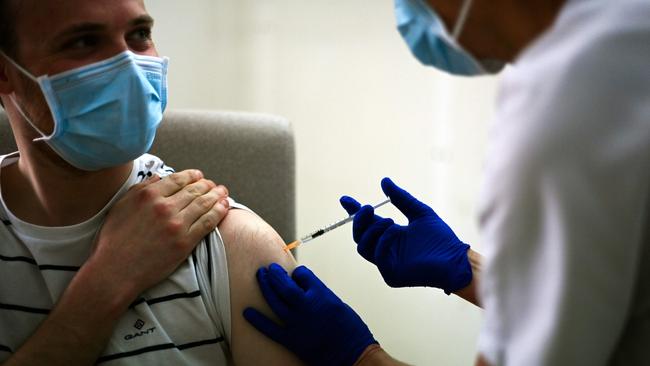Vaccine row brings EU struggles into the open
Many Europeans are in the dark as to when they will be immunised against COVID-19.

Towards the end of an interview last week about the European Commission’s struggle to secure sufficient supplies of COVID-19 vaccines, Ursula von der Leyen, its beleaguered president, was asked a personal question: when did the 62-year-old expect to be given her own jab?
Not for the first time in a crisis that has laid bare the shortcomings of the Brussels bureaucracy and its German leader, she appeared unsure.
“This is a good question … I do not know at the moment,” she laughed, according to the news website Politico, among 10 news organisations invited to grill her. “We are in the scheme of the Belgian authorities. So I would have to ask, honestly.”
Many other people living not just in Belgium but elsewhere across the continent are as much in the dark as the commission president as to when they will be immunised — except they know that for most it is unlikely to be any time soon.
After a week in which Britain administered its 10-millionth vaccination, the 27 EU countries — with almost seven times as many people — have only just passed the 15.5 million mark. While most British adults are expected to have received the jab by the end of May, those in Europe will have to wait longer, with supply shortages meaning only 88 million doses are due to arrive this month and next.
With the finger of blame pointing at the commission, von der Leyen has fought back, rejecting calls to resign and insisting the time to “make a final assessment” of her performance will be at the end of her term in 2024.
Member states are also rallying behind her, in public at least — not least because they agreed a pan-European approach to vaccination with Brussels in charge.
“What would people say if countries like France and Germany were competing with each other on vaccines?” said French President Emmanuel Macron after talks with German Chancellor Angela Merkel at the weekend. “It would be a mess, and counter-productive.”
Merkel agreed “the basic decision to order together as the European Union was and is right”, even though her own Vice-Chancellor, Olaf Scholz, said he stood by his comments, leaked from a cabinet meeting, that von der Leyen’s performance had been “shit”.
Other European leaders, especially from the east, are also critical. Hungarian Prime Minister Viktor Orban has accused the EU of being too slow to approve and deliver vaccines, adding: “He who is fast, lives, who is slow, loses his life.”
He was speaking during a visit by Andrej Babis, his Czech counterpart, to Budapest on Friday to discuss joint efforts to buy vaccines made in Russia and China, outside the EU’s joint procurement program.
Von der Leyen also unwittingly gave fuel to her critics by admitting that a country such as Britain acting on its own can perform more like a “speedboat” than the EU “tanker” when organising a vaccination program. Such sentiments are also increasingly common behind closed doors in EU capitals. The commission wanted “to act like a government” when it thought it would get the glory, but does not want to accept responsibility now things were going wrong, said a Brussels-based diplomat.
Von der Leyen will get a taste of such dissatisfaction when she appears before the European parliament on Thursday AEDT and has to explain the commission’s slowness in signing contracts with drugs companies.
There will questions, too, especially from Irish members, over the commission’s almost casual decision last weekend to trigger article 16 of the Northern Ireland protocol — in effect reimposing a hard border with Ireland — to prevent a possible flow of vaccines from the south of the island to the north. Although reversed within hours under pressure from London and Dublin, the move was condemned as a serious political error.
Von der Leyen must also face EU leaders at a virtual summit on February 25-26. They are expected to order her to draw up a report on how better to respond to health crises.
“I can imagine leaders saying in the future we should take into account what has happened, we should be more cognisant of mistakes we’ve made on the way — which in diplomatic language means you guys have made a mistake big time,” one EU diplomat said.
Leaders would nevertheless not be too harsh on von der Leyen because “people want to co-operate and they want to get results”.
As for her own vaccination, the latest timetable laid out by Belgian authorities suggests under-65s without serious health conditions are unlikely to be vaccinated before late northern spring or summer — though those whose “economic or social function is essential” could get the jab as early as next month.
It is not clear whether von der Leyen will be among them.
The Times



To join the conversation, please log in. Don't have an account? Register
Join the conversation, you are commenting as Logout